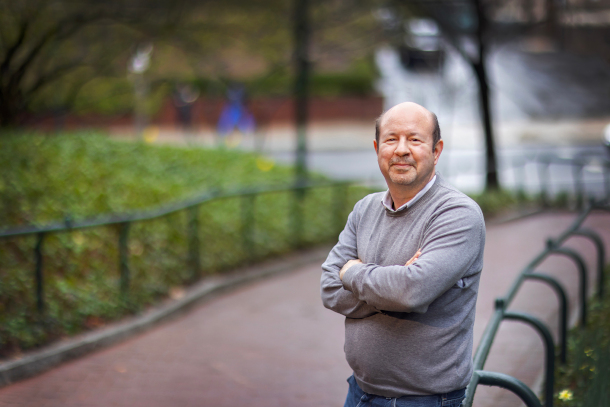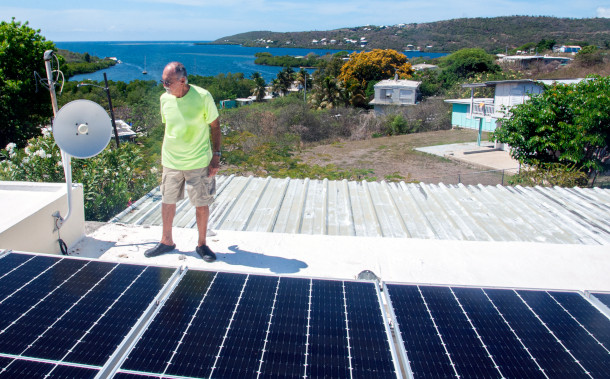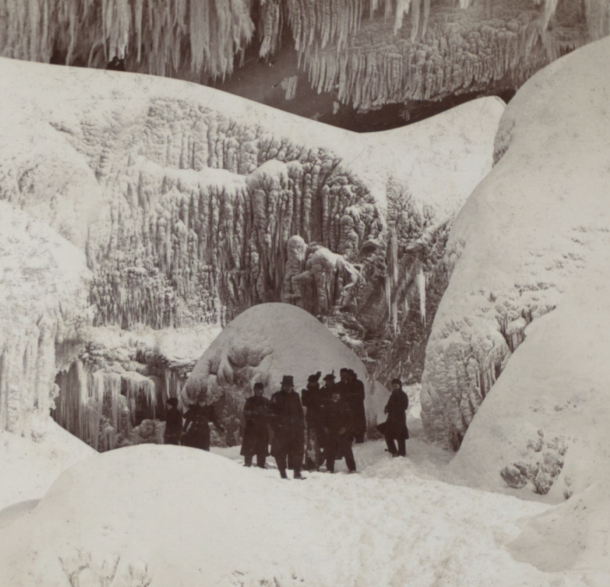Mann Bites Lapdogs (Beyond The Headlines)
Air Date: Week of February 16, 2024

Michael Mann is a world-renowned climate scientist and a Presidential Distinguished Professor at the University of Pennsylvania. (Photo: Eric Sucar, Courtesy of Michael Mann)
This week, Living on Earth Contributor Peter Dykstra and Host Steve Curwood catch up on climate scientist Michael Mann’s $1 million legal victory over bloggers who were found to have defamed him. Also, Puerto Rico is encouraging more solar development to help with grid reliability and reduce emissions, and in history they look back to when an ice jam left Niagara Falls high and dry.
Transcript
CURWOOD: And now it's the time in the broadcast when we turn to Peter Dykstra. Peter is a contributor to Living on Earth and typically looks beyond the headlines for us, although he does offer other observations from time to time. He's on the line now from Atlanta, Georgia. Hi there, Peter. How you doing?
DYKSTRA: Hi, Steve. I'm doing well. And I hope you are too. We're gonna start with a landmark case, a big victory for climate science. Michael Mann, one of the best-known climate scientists, and that also makes him one of the biggest targets among climate scientists on a political and climate denial level. He just won a judgment for more than a million dollars. He was judged to have been defamed by bloggers who accused him of data manipulation and somehow drew an analogy to a child molester who had a famous case on the Penn State campus years ago. Mike Mann, in defense of his own work and that of other scientists, dove right into the political and the legal end of it, and took on the people who were found to have defamed him. It was a big victory for climate science, and a huge and costly loss for one of the sources of climate denial.
CURWOOD: That's right. I mean, Michael Mann, who has been on this broadcast a number of times because he does a great job of explaining climate science, had his emails hacked back in 2009, in the run-up to the Copenhagen UN Climate Summit. And these emails had some casual conversation among scientists that folks in industry tried to twist into, oh, this isn't really happening. That is, climate change isn't really happening, or the scientists are skeptical about it. And from then on, things were very difficult. And now he has this amazing victory against those people online who would defame him unfairly and frankly, maliciously.
DYKSTRA: Now there's a consequence for some of the worst of the climate deniers, and Mann is richer for it, although I don't think he ever got into this for the money. And now he's going to be much, much harder to attack irresponsibly, as are other scientists who deal not only with climate, but also things like vaccines.
CURWOOD: Hey, what else do you have for us today?

Puerto Rico is planning to convert massive amounts of their electrical grid over to solar power in hopes of creating a more reliable, sustainable system. (Photo: Chris Bentley, WBUR, Flickr, CC BY-NC-ND 2.0)
DYKSTRA: A story from Puerto Rico. And of course, Puerto Rico's electric grid was almost entirely taken down by Hurricane Maria back in 2017. The island went without power for a long time. Some of the more remote places in Puerto Rico went without power for months on end. A lot of corruption was found in the Power Authority there. That's been addressed, in addition to the fact that Puerto Rico has affirmed its commitment to turn more and more to solar energy.
CURWOOD: Right, I've seen the plans are to use solar to set up microgrids in various parts of the island so that when the storms come—and the storms come fairly often to Puerto Rico, given where it is in the Caribbean—that all the lights won't go out. Plus, when you use solar, you don't have to pay the oil bill, because central power in Puerto Rico was done by bunker fuel, expensive oil that had to be shipped over to the island, whereas Puerto Rico itself has plenty of local sunshine. And Peter, I believe, as we were getting ready for the broadcast, you told me they had put this in the law, actually, to go solar.
DYKSTRA: Right, and they specifically addressed climate change as a reason for going solar. Puerto Rico has arguably more to lose from climate change than many places in the world.
CURWOOD: Indeed. Time now to take a look back in history, Peter, what do you see?

Niagara’s Cave of the Winds, photographed in the 19th century. (Photo: The Robert N. Dennis collection of stereoscopic views, New York Public Library, Wikimedia Commons, Public Domain)
DYKSTRA: We can go back to February 18, 1896. An ice jam in the Niagara River above Niagara Falls reduced that landmark to a trickle of water, it blocked the flow over those 150-plus-foot twin falls. The Cave of the Winds, a famous part of the landmark, went virtually dry for the first time in 50 years. The falls going dry is a periodic thing, sometimes due to ice jams or droughts. Sometimes due to human intervention. In 1969, engineers blocked the American Falls, diverting water to the Horseshoe Falls on the Canadian side so that geologists could study the cliff on the American side. And again just a couple of years ago in 2022, the American Falls was briefly shut down to allow for repairs to century-old trails and bridges.
CURWOOD: Well thanks, Peter. Peter Dykstra is a contributor to Living on Earth, and we'll talk to you again real soon.
DYKSTRA: Okay, Steve, thanks a lot. Talk to you soon.
CURWOOD: And there's more on these stories on the Living on Earth webpage. That's loe.org.
Links
Grist | “As States Slash Rooftop Solar Incentives, Puerto Rico Extends Them”
Learn more about Niagara Falls’ Cave of the Winds going dry in 1896
Living on Earth wants to hear from you!
Living on Earth
62 Calef Highway, Suite 212
Lee, NH 03861
Telephone: 617-287-4121
E-mail: comments@loe.org
Newsletter [Click here]
Donate to Living on Earth!
Living on Earth is an independent media program and relies entirely on contributions from listeners and institutions supporting public service. Please donate now to preserve an independent environmental voice.
NewsletterLiving on Earth offers a weekly delivery of the show's rundown to your mailbox. Sign up for our newsletter today!
 Sailors For The Sea: Be the change you want to sea.
Sailors For The Sea: Be the change you want to sea.
 The Grantham Foundation for the Protection of the Environment: Committed to protecting and improving the health of the global environment.
The Grantham Foundation for the Protection of the Environment: Committed to protecting and improving the health of the global environment.
 Contribute to Living on Earth and receive, as our gift to you, an archival print of one of Mark Seth Lender's extraordinary wildlife photographs. Follow the link to see Mark's current collection of photographs.
Contribute to Living on Earth and receive, as our gift to you, an archival print of one of Mark Seth Lender's extraordinary wildlife photographs. Follow the link to see Mark's current collection of photographs.
 Buy a signed copy of Mark Seth Lender's book Smeagull the Seagull & support Living on Earth
Buy a signed copy of Mark Seth Lender's book Smeagull the Seagull & support Living on Earth

